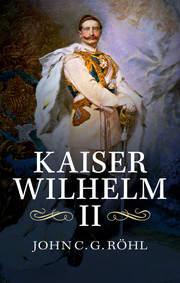Book contents
- Frontmatter
- Dedication
- Contents
- List of figures
- Acknowledgements
- Preface to the English edition
- Preface to the German edition
- Acknowledgements
- Overview: Wilhelm the Last, a German trauma
- Part I 1859–1888: The Tormented Prussian Prince
- Part II 1888–1909: The Anachronistic Autocrat
- Part III 1896–1908: The Egregious Expansionist
- 10 The challenge to Europe: Weltmachtpolitik and the battlefleet
- 11 The Russo-Japanese War and the meeting of the emperors on Björkö (1904–1905)
- 12 War in the west? The landing in Tangier and the fiasco of Algeciras (1905–1906)
- 13 The intensification of the Anglo-German conflict
- Part IV 1906–1909: The Scandal-Ridden Sovereign
- Part V 1908–1914: The Bellicose Supreme War Lord
- Part VI 1914–1918: The Champion of God’s Germanic Cause
- Part VII 1918–1941: The Vengeful Exile
- Notes
- Index
11 - The Russo-Japanese War and the meeting of the emperors on Björkö (1904–1905)
Published online by Cambridge University Press: 05 September 2014
- Frontmatter
- Dedication
- Contents
- List of figures
- Acknowledgements
- Preface to the English edition
- Preface to the German edition
- Acknowledgements
- Overview: Wilhelm the Last, a German trauma
- Part I 1859–1888: The Tormented Prussian Prince
- Part II 1888–1909: The Anachronistic Autocrat
- Part III 1896–1908: The Egregious Expansionist
- 10 The challenge to Europe: Weltmachtpolitik and the battlefleet
- 11 The Russo-Japanese War and the meeting of the emperors on Björkö (1904–1905)
- 12 War in the west? The landing in Tangier and the fiasco of Algeciras (1905–1906)
- 13 The intensification of the Anglo-German conflict
- Part IV 1906–1909: The Scandal-Ridden Sovereign
- Part V 1908–1914: The Bellicose Supreme War Lord
- Part VI 1914–1918: The Champion of God’s Germanic Cause
- Part VII 1918–1941: The Vengeful Exile
- Notes
- Index
Summary
Without a solution to the strategic dilemma in the west, Wilhelm II’s ambition to achieve German hegemony in Europe and a large colonial empire overseas remained a very distant prospect for the time being. Yet the alliance concluded between Britain and Japan in 1902 marked a shift in the international states system that seemed to hold out the promise of a dramatic triumph over his Russian relatives in the east. He had worked to bring about the marriage between Tsar Nicholas II and his (Wilhelm’s) cousin Alicky of Hesse and the Rhine, now the Tsarina Alexandra, and his brother Heinrich was married to Alexandra’s younger sister, Irène. Since ‘Nicky’s’ accession in 1894, mostly without the knowledge of the Reich Chancellor or the Foreign Office, ‘Willy’ had kept up a highly political correspondence in English with him, which shocked the world when it was published by the Bolsheviks in 1918. The ‘Willy–Nicky correspondence’ reached a new intensity in 1902. From then on, Wilhelm II openly pursued the goal of entangling the tsar in a war with Japan, by assuring him of German backing. If this succeeded, he calculated, Russia would be tied up in the Far East for a long time, France would therefore be isolated and Germany’s pre-eminence over the entire Eurasian continent would be as good as assured.
Never had the chances of a breakthrough to world power seemed within closer reach than in the years from 1902 to 1905. In his letters and telegrams to the infantile Nicholas II and in their meetings at Gdansk (then called Danzig), Tallinn (then called Reval), Wiesbaden and Darmstadt, Wilhelm urged the tsar to turn away from Europe, annex Manchuria and Korea and threaten the British in India, Afghanistan and Persia. As he had done with the notorious drawing ‘Nations of Europe, protect your holiest possessions!’, which he had sent to the tsar in 1895, Wilhelm put pressure on Nicholas, telling him that his God-given role was the defence of Christendom and the white race against the heathen ‘Yellow peril’, and that he could regard himself as ‘Admiral of the Pacific’, while he, Wilhelm, would play his part as ‘Admiral of the Atlantic’.
- Type
- Chapter
- Information
- Kaiser Wilhelm IIA Concise Life, pp. 83 - 85Publisher: Cambridge University PressPrint publication year: 2014



